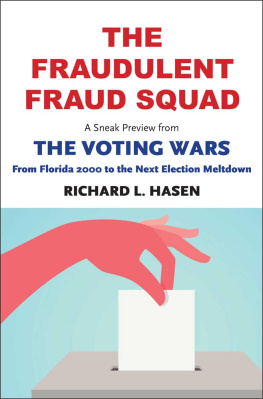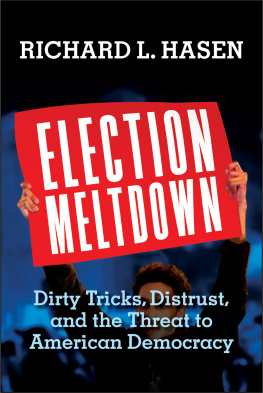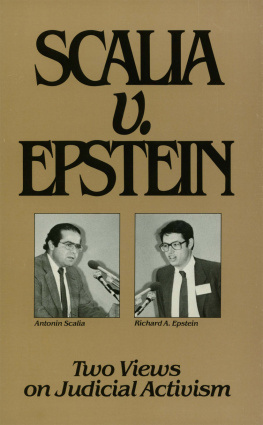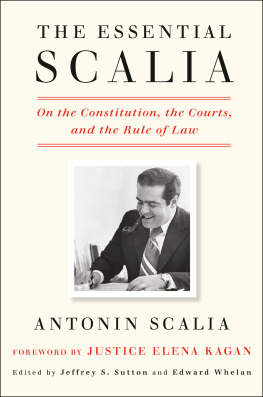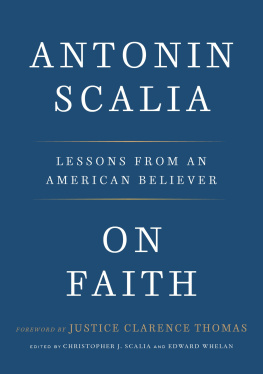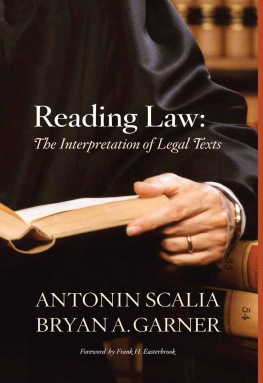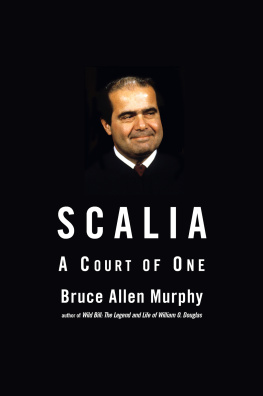THE JUSTICE OF CONTRADICTIONS
RICHARD L. HASEN
The Justice of Contradictions
ANTONIN SCALIA AND THE POLITICS OF DISRUPTION

Published with assistance from the Ralph S. Brown Memorial
Publication Fund, and from the Mary Cady Tew Memorial Fund.
Copyright 2018 by Richard L. Hasen.
All rights reserved.
This book may not be reproduced, in whole or in part, including
illustrations, in any form (beyond that copying permitted by Sections 107
and 108 of the U.S. Copyright Law and except by reviewers for the public
press), without written permission from the publishers.
Yale University Press books may be purchased in quantity for
educational, business, or promotional use. For information, please e-mail
(U.K. office).
Set in Scala and Scala Sans type by Integrated Publishing Solutions,
Grand Rapids, Michigan.
Printed in the United States of America.
ISBN 978-0-300-22864-9 (hardcover : alk. paper)
Library of Congress Control Number: 2017952553
A catalogue record for this book is available from the British Library.
This paper meets the requirements of ANSI/NISO Z39.48-1992
(Permanence of Paper).
10 9 8 7 6 5 4 3 2 1
For Lori,
who continues to amaze, support, and inspire
CONTENTS
PREFACE
JUSTICE ANTONIN SCALIA WAS A POLARIZING figure in polarized times, a disruptor of the challenged political order who arrived on the scene decades before the election of Donald Trump as president. To many on the right, he was a hero, a rare principled Supreme Court justice who established and applied neutral principles to the most difficult cases, even when doing so meant going against his own conservative preferences. His supporters believe he fearlessly spoke up for those who otherwise had no voice among the Ivy League elites dominating law and government. To many on the left he was an unscrupulous foe, a justice who let his political, religious, and social conservatism drive him to result-oriented decisions and who needlessly hurled vicious insults at fellow justices and others.
Neither caricature is fair, nor does it capture the full picture of one of the most important figures in the American legal scene in the last century. More than anything, Justice Scalia was full of contradictions, and not just in his written opinions.
He wrote that his ideas could increase the legitimacy of judicial decisionmaking, yet his attacks on his opponents may have undermined it. He offered jurisprudential theories to guide all cases, yet these doctrines were flexible enough to allow him, in most of the cases most important to him, to deliver opinions consistent with his ideology. He was an originalist who believed constitutional provisions should be interpreted in line with their public meaning at the time of enactment, except when he wasnt. He sometimes followed what he considered to be errant precedent because the law was settled, and at other times he simply ignored originalist analysis altogether.
He saw judges as having a limited role in ensuring compliance with the rule of law, articulating a faith in popular sovereignty, freedom, and majority rule that did not always guide his actions. For example, in United States v. Windsor, a decision from 2013 striking down part of the federal Defense of Marriage Act aimed at limiting the rights of same-sex couples, he protested that the Court had no power under the Constitution to invalidate this democratically adopted legislation. This statement came a day after he unselfconsciously joined the majority opinion in Shelby County v. Holder, striking down a key part of the federal Voting Rights Act, a law Congress had enacted in 1965 and which large bipartisan congressional majorities had repeatedly reenacted and expanded.
His writings and interactions with others revealed more contradictions. He was a Harvard Law School graduate who peppered his sophisticated writing with folksy terms like jiggery pokery. He called himself a language snoot but railed against Ivy League elites determining the path of American law. He was a relentless critic of the ideas and writing of others, but he sometimes bristled at criticism directed at him, and in many instances he simply ignored serious good-faith critiques of his ideas and theories.
He was a disruptor of the established order, seeking to undermine common approaches to American jurisprudence with new and revamped theories of interpretation. But he was not willing to disrupt too much, often rejecting his fellow originalist Clarence Thomass efforts to follow originalism to its logical conclusion and upset settled precedent. Scalia often was bolder in his pronouncements than in his judicial votes, leading supporters and detractors alike to criticize him for not remaining true to the theories he espoused.
Scalia was a bombastic, larger-than-life figure who engendered strong feelings across the political spectrum with his words and actions both on and off the bench, and he did not hold back in expressing his views. He was an exceptionally effective writer. His tone was nimble, direct, and conversational, yet he did not dumb things down for his audience. He got attention for his ideas, especially among law students and lawyers, through the clarity, forcefulness, and more than occasionally the nastiness of his words.
He was an American patriot who believed he was offering ideas to improve the American legal system and democracy. He changed the way judges think and talk about statutes. He gave key conservative acolytes tools, which he represented as politically neutral, to advance an ideological agenda. And he opened the door for others to delegitimize ideological opponents, rather than simply disagreeing with them.
In the end, the contradictions of his approach appear likely to limit his longer-term influence, whether the Supreme Court ends up being populated with many more originalists and textualists such as the newly appointed Justice Neil Gorsuch or not. He helped make the Court a more political institution, a legacy that could well affect American law and American politics for decades. He proved no more able to escape his contradictions than to create a purely neutral approach to judging cases on the Supreme Court.

This book is not a biography. Many fine ones are out there, including Joan Biskupics excellent book from 2009, American Original: The Life and Constitution of Supreme Court Justice Antonin Scalia. If you want to understand what made Justice Scalia tickhis upbringing, his religious convictions, and his family lifeBiskupics book is an excellent place to start. You might also consult some of the many tributes to Justice Scalia written by his supporters. Kannon Shanmugam, a former clerk for Scalia and one of the nations top Supreme Court litigators, described what he called Scalias extraordinary personal qualities, writing that Justice Scalia was devoted above all to his family and to his faith. He was also an utterly charming person who lived life to the fullest. Spending time with Justice Scalia was like being in the presence of a one-man party.
Neither is this book meant to be a comprehensive examination of all of Scalias opinions and ideas. Such a catalogue would easily be five times longer, much denser, and (I hope) less enjoyable to read.
Instead, I explore Scalias fundamental contradictions through an examination of his jurisprudential theories of textualism and originalism, his inimitable and often caustic tone in dealing with his adversaries on and off the Court, and his jurisprudence in key areas of modern American law: cases in the culture wars, including abortion, same-sex marriage, guns, affirmative action, and religion; cases bearing on democracy, including campaign finance and the First Amendment, gerrymandering, voting rights, federalism, and separation of powers; and cases in criminal law, including his views on the death penalty, the constitutional right of criminal defendants to confront their accusers, and the war on terror. The resulting book is holistic rather than chronological, and thematic rather than comprehensive. It gives a view from this point in time of his likely legacy, recognizing that things may look different fifty or a hundred years from now.
Next page

